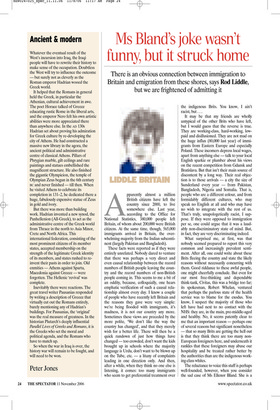Ancient & modern
Whatever the eventual result of the West’s incursion into Iraq, the Iraqi people will have to rewrite their history to make sense of the occupation. Doubtless the West will try to influence the outcome — but surely not as cleverly as the Roman emperor Hadrian wooed the Greek world.
It helped that the Romans in general held the Greek, in particular the Athenian, cultural achievement in awe. The poet Horace talked of Greece educating rustic Rome in the liberal arts, and the emperor Nero felt his own artistic abilities were more appreciated there than anywhere else. In the AD 130s Hadrian set about proving his admiration for Greek culture by re-developing the city of Athens. He had constructed a massive new library in the agora, the ancient political and administrative centre of classical Athens. Pillars of Phrygian marble, gilt ceilings and rare paintings and statues embellished the magnificent structure. He also finished the gigantic Olympieion, the temple of Olympian Zeus begun in the 6th century BC and never finished — till then. When he visited Athens to celebrate its completion in 131–2, he dedicated there a huge, fabulously expensive statue of Zeus in gold and ivory.
But there was more than building work. Hadrian invented a new synod, the Panhellenion (All-Greek), to act as the administrative centre of the Greek world from Thrace in the north to Asia Minor, Crete and North Africa. This international federation, consisting of the most prominent citizens of its member states, accepted membership on the strength of the legitimate Greek identity of its members, and states rushed to reinvent their pasts in order to join. Old enmities — Athens against Sparta, Macedonia against Greece — were forgotten. The Hellenic ‘revival’ was complete.
Inevitably there were reactions. The great travel writer Pausanias responded by writing a description of Greece that virtually cut out the Romans entirely, barely mentioning any of Hadrian’s buildings. For Pausanias, the ‘original’ was the real measure of greatness. In the historian Plutarch’s deeply influential Parallel Lives of Greeks and Romans, it is the Greeks who set the moral and political agenda, and the Romans who have to match up.
So when the war in Iraq is over, the history war will remain to be fought, and will need to be won.


































































































 Previous page
Previous page